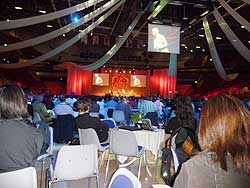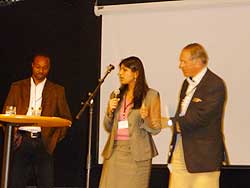News

The Tallberg Foundation in partnership with YES Inc. brought together 1,700 youth leaders and decision makers from 120 countries to the 5th Global YES Summit �€“ �€˜Rework the World�€™ in June 2010. The Summit was held in the picturesque town of Leksand, Sweden, along Lake Siljan. Every summer for nearly three decades, the Tallberg Foundation has gathered leaders from around the world and a variety of backgrounds for discussions and reflection. The Summit this year combined these leaders together with hundreds of youth leaders, innovators, and entrepreneurs, to discuss the means for a sustainable future and to rework the world. Throughout the summit, participants were given the chance to view first hand 100 concrete, environment friendly and sustainable initiatives for the future.
Spread over three days and 140 workshops and panel sessions, the discussions were centred on five themes �€“ Water, Energy, Land, People, and Cities. Ambika Vishwanath, Research Analyst at SFG, was invited to be a panellist on the water themed introduction session. The interactive panel session introduced issues relating to water, and discussed the challenges along the water cycle and how these related to global concerns for security and health. During the session small scale initiatives were presented on water, sanitation and irrigation, and the panel discussed the challenges to integrate these efforts into the main stream business and political landscape.

The other panel members were Jakob Granit of SIWI, Olatunji Iretomiwa from the World Bank, and Per Olof Nyquist of ABS Group, Sweden. The session was moderated by Jan Eliasson, former Swedish Minister for Foreign Affairs and Chairman of Wateraid, Sweden, with Ismail Serageldin, Director of Bibliotheca Alexandrina, giving the concluding remarks.
Interactive discussions identified key challenges such as the need for finances, a lack of knowledge, gaps in communication between stakeholders and a problem of perception with regard to the issue of water. Recognising the importance of local initiatives, the panel addressed the need for a proper institutional framework, as well as dialogue between all the stakeholders. There was also a strong emphasis on learning and using traditional wisdom that has governed this sector in the past. The ideas and conclusions from this panel layed the framework for discussions in a number of smaller workshops during the course of the Summit on Water. Similar discussions were also conducted for the other themes.





